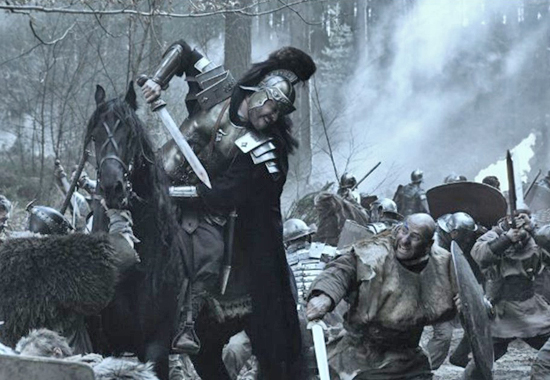DURING DARK AGES
STORY IN ENGLAND
DURING DARK AGES
STORY OF WILLIAM THE CONQUEROR

----------------------------
At the time when William the Norman was making good his claim to the Dukedom won by Rolfganger, the Saxons had been settled in England for nearly six centuries. During that long period, however, the country had frequently been exposed to the horrors of civil war and to the inroads of those ruthless Northmen, who "replunged into barbarism the nations over which they swept."

Picts and Scots
year 451 that the Saxons, with huge axes on their shoulders, set foot on the shores of Britain. At that period—when the ancient Britons, left by the Roman conquerors at the mercy of the Picts and Scots, were complaining that the barbarians drove them to the sea, and that the sea drove them back to the barbarians—there anchored off the coast of Kent three bulky ships, commanded by Hengist and Horsa, two Saxon chiefs, who claimed descent from Woden, their god of war, and boasted of some military skill acquired when fighting in the ranks of Rome. From Hengist and Horsa, still worshippers of Thor and Woden, the Britons implored aid against the Picts and Scots; and the Saxon chiefs, calling over a band of their countrymen, speedily drove the painted Caledonians to their mountains and fastnesses
After having rescued the Britons from their northern neighbours, the Saxons did not exhibit any haste to leave the country which they had delivered. Indeed, these mighty sons of Woden rather seemed ambitious of making Britain their own; and Hengist, having settled in Lincolnshire, gave a great feast. Among other guests who on this occasion came to the Saxon's stronghold was Vortigern, a King among the Britons, and, his eye being arrested and his heart inflamed by the grace and beauty of Rowena, the daughter of Hengist, while she presented the wassail-cup on bended knee, he became so desperately enamoured that he never rested till the fair and fascinating Saxon was his wife. After the marriage of Vortigern and Rowena, the Saxons plainly intimated their intention of being masters of Britain, and, the sword having been drawn, the two races—the Saxons and the Celts—commenced that struggle which lasted for more than a hundred and fifty years, during which King Arthur and the Knights of his Round Table are said to have wrought those marvellous exploits which have been celebrated by chroniclers and bards
As time passed on, Egbert, King of Wessex, in 827 prevailed over all rivals, formed the separate provinces into a single state, and reigned as King of England. But while the Saxons were still engaged in putting down the Celts and cutting each other to pieces, a band of grim adventurers one morning sailed into the port of Teignmouth. In the discharge of his duty, a Saxon magistrate proceeded to the shore to learn whence they came and what they wanted. Without deigning an answer, the strangers slew the magistrate and his attendants, plundered the town, carried the booty to their ships, and then, hoisting their sails, took their departure. This was the first appearance in England of those Danes who were, ere long, to rend the Anglo-Saxon empire in pieces, and place their King on the English throne.
Such was the state of affairs when, in 871, a Saxon King, named Ethelred, was slain in a conflict with the Danes, and was succeeded by his son, Alfred, afterwards Alfred the Great, but then a youth oftwenty-two. At first, the courage and ability of the young King inspired the Saxons with high hopes. But Alfred, puffed up with conceit of his superior knowledge, despised those whom he governed, and his contemptuous indifference to their opinions and wishes rendered him ere long so very unpopular that when, after having reigned seven years, he was under the necessity of preparing against an inroad of the Danes, he found himself, to his mortification, almost unsupported. In vain the King, after the fashion of his ancestors, sent messengers of war to town and hamlet, bearing the arrow and naked sword, and proclaiming, "Let each man that is not a nothing leave his house and come!" So few obeyed the summons that Alfred, deeply mortified, abandoned his throne, and sought refuge in Cornwall.
After the death of Alfred the Great, who had, after his restoration, reigned with lustre and glory, Ethelstane, pursuing Alfred's conquests, recovered York, crossed the Tweed, defeated the Danes and Cambrians at Bamborough, and brought the whole island under his dominion. For some time after Ethelstane's triumphs, the Saxons were allowed unmolestedly to sow and reap, to buy and sell, to marry and give in marriage.
In 1035, however, when Canute the Great went the way of all flesh, and when his remains were laid in the Cathedral of Winchester, there was living in London one of his illegitimate sons, named Harold, who, from his swiftness in running, was surnamed Harefoot. Immediately, Harold Harefoot claimed the crown, and a contest took place between his adherents and those of Hardicanute, who was then in Denmark. Harold Harefoot, however, being favoured by the Danes of London, carried the day; and finding that the Archbishop refused to perform the ceremony of coronation, he placed the crown on his head with his own hand, became an avowed enemy of the Church, lived as one "who had abjured Christianity," and displayed his contempt for religious rites by having his table served and sending out his dogs to hunt at the hour when people were assembling for worship
Walang komento:
Mag-post ng isang Komento